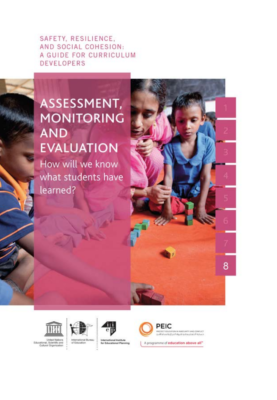
This publication is one of a series of eight curriculum development booklets focused on promoting safety, resilience, and social cohesion throughout the curriculum.
Education protects learners and their communities by providing life-saving advice in cases of emergency. Good planning can save the cost of rebuilding or repairing expensive infrastructure and education materials. Over the long term, crisis-sensitive education content and planning strengthen the resilience of education systems and contribute to the safety and social cohesion of communities and education institutions.
The devastating impact of both conflict and disasters on children and education systems is well documented and has triggered a growing sense of urgency worldwide to engage in strategies that reduce risks. Annually, 175 million children are likely to be affected by disasters in the present decade (Penrose and Takaki, 2006), while the proportion of primary-aged out-of-school children in conflict-affected countries increased from 42 percent of the global total in 2008 to 50 percent in 2011.
The urgency of developing education content and sector plans that address these risks is undeniable. This series of booklets aim to support ministries of education to do just that. This collaboration and the overall framework build on the efforts and momentum of a wide range of stakeholders, including UNICEF and its Peacebuilding, Education and Advocacy programme.
Author(s): IEEP
Year Published: 2015
Language: English
Country: France
Download: https://neqmap.bangkok.unesco.org/wp-content/uploads/2019/06/Booklet-8.pdf


